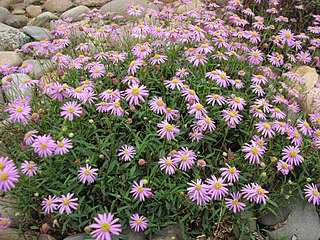
Brachyscome is a genus of flowering plants in the family Asteraceae. Most are endemic to Australia, and a few occur in New Zealand and New Guinea.

Grevillea × gaudichaudii is a hybrid species of flowering plant in the family Proteaceae and is endemic to a restricted area of New South Wales. It is a prostrate shrub with deeply lobed leaves and toothbrush-like groups of dark pink to burgundy-red flowers. The plant is a popular garden ground-cover.

Brachyscome multifida is a perennial herb in the family Asteraceae. Common names include cut-leaved daisy, rocky daisy, and Hawkesbury daisy. The species is endemic to Australia.
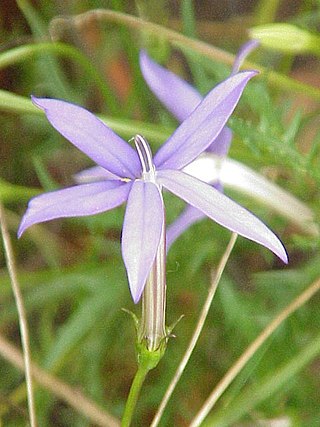
Isotoma axillaris, commonly known as rock isotome or showy isotome, is a small herbaceous perennial in the family Campanulaceae. It usually has blue or mauve star-shaped flowers from September to May. It may also be called blue star, star flower, or laurentia.
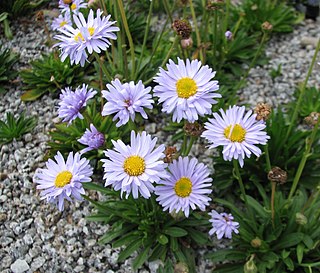
Brachyscome scapigera, commonly known as tufted daisy, is a perennial herb in the family Asteraceae. The species is endemic to south-eastern Australia.
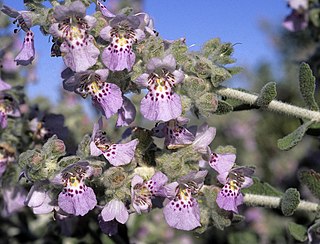
Quoya is a genus of flowering plants in family Lamiaceae and is endemic to Western Australia. Plants in this genus are shrubs with five petals joined to form a tube-shaped flower with four stamens of unequal lengths.

Quoya cuneata is a flowering plant in the mint family Lamiaceae and is endemic to the south-west of Western Australia. It is a spreading shrub with its branches and leaves covered with a layer of woolly, pale white or brownish hairs. The flowers are blue at first but become white with purple spots inside the petal tube.

Fimbristylis littoralis, commonly known as lesser fimbry or lesser fimbristylis, is a sedge of the family Cyperaceae that is native to many countries in Africa, Asia and Oceania including across much of northern Australia.

Brachyscome aculeata, commonly known as hill daisy, is a tufted perennial herb in the family Asteraceae and is endemic to Australia. It has mostly white daisy-like flowers, a yellow centre, variable shaped leaves and flowers in spring to autumn.

Brachyscome ascendens, the border ranges daisy, is a species of flowering plant in the family Asteraceae and is endemic to Australia. It has mostly mauve daisy-like flowers and a yellow centre.

Brachyscome graminea, commonly known as grass daisy, is a perennial herb in the family Asteraceae and is endemic to Australia. It has mostly mauve-pink or purple daisy-like flowers and a yellow centre.
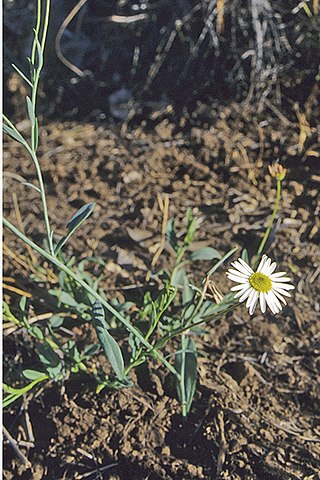
Brachyscome basaltica, commonly known as swamp daisy, is a perennial herb in the family Asteraceae and is endemic to Australia. It has mostly white daisy-like flowers and a yellow centre.

Brachyscome decipiens, commonly known as field daisy, is a perennial herb in the family Asteraceae and is endemic to Australia. It is a small herb with white or pale blue flowers.

Brachyscome nivalis, commonly known as snow daisy, is a perennial herb in the family Asteraceae and is endemic to Australia. It has mostly white daisy-like flowers, yellow centres and deeply lobed leaves.

Ptilotus divaricatus is a shrub in the Amaranthaceae family.
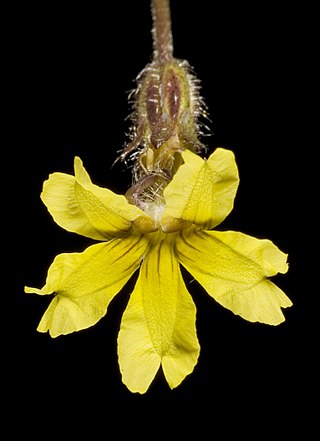
Goodenia berardiana is a species of flowering plant in the family Goodeniaceae and is endemic to Australia. It is an erect, widely distributed and variable annual herb with linear to egg-shaped, sometimes lobed or toothed leaves, and yellow flowers arranged in leafy racemes or few-flowered umbels.
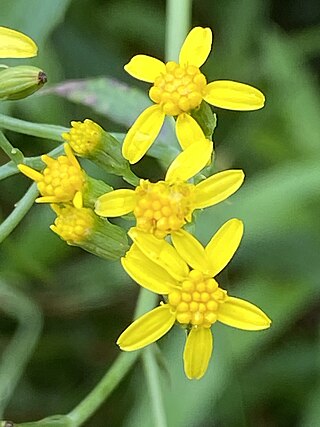
Senecio linearifolius, commonly known as fireweed groundsel, is a species of flowering plant in the family Asteraceae. It is a small shrub with variable leaves, numerous heads of yellow flowers and grows in Tasmania, New South Wales and Victoria.

Olearia paucidentata, the autumn scrub daisy, is a species of flowering plant in the family Asteraceae and is endemic to the south-west of Western Australia. It is a shrub with variably-shaped leaves, and white, mauve or blue and mauve or yellow, daisy-like inflorescences.

Vittadinia muelleri, commonly known as narrow-leaf New Holland daisy, is a flowering plant in the family Asteraceae. It is a small perennial forb with bright green leaves and purple daisy-like flowers. It grows in New South Wales, Victoria, Tasmania and the Australian Capital Territory.

Brachyscome spathulata, commonly known as spoon-leaved daisy, is a flowering plant in the family Asteraceae. It has dark green leaves, mauve daisy-like flowers and grows in New South Wales, Tasmania, Victoria and the Australian Capital Territory.




















